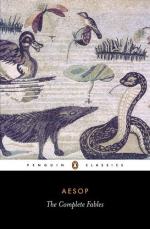|
This section contains 3,671 words (approx. 13 pages at 300 words per page) |

|
SOURCE: "Introduction," in Aesop without Morals, translated and edited by Lloyd W. Daly, pp. 11-26. New York: Thomas Yoseloff, 1961.
In the following excerpt, Daly asserts that the morals that appearat the end of Aesopic fables are additions made by later generations which do nothing to clarify the meaning of the original tale.
The Fables. "Know thyself," commanded one of the legends inscribed on the temple of Apollo at Delphi, and Socrates echoed to the Athenian court that condemned him, "the unexamined life is not worth a man's living." This introspective bent, this disposition toward self-criticism, was part of the Greek genius for "seeing life steadily and seeing it whole." It might express itself in tragedy, or it might express itself in comedy; Nietzsche labeled its more austere and measured expression Apollonian, its more enthusiastic and irrational side Dionysian.
When the Greek looked at himself, he was not always...
|
This section contains 3,671 words (approx. 13 pages at 300 words per page) |

|


